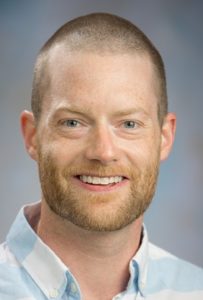
Pat Keys, formerly the lead scientist with Colorado State University’s School of Global Environmental Sustainability, has joined the Department of Atmospheric Science as an assistant professor. Keys focuses on climate change impacts and human adaptation, creative scenarios developed through machine learning and science fiction storytelling, and societal interaction with the atmospheric water cycle.
Prior to joining SoGES, Keys founded an environmental consultancy that worked with local and international partners. His fieldwork has taken him all over the world, from exploring climate impacts in Vietnam to documenting indigenous perspectives on conservation in American Samoa. He studied agricultural water policy in Morocco, the link between drought and conflict in sub-Saharan Africa, and municipal responses to extreme heat and wildfire smoke in Fort Collins.
Keys presented the keynote address to the United Nations General Assembly’s 2nd committee in 2019, speaking on the challenges of achieving global sustainability. He is a member of the advisory council for CSU’s Center for Environmental Justice and the African Futures Advisory Board based at the University of Witwatersrand, South Africa.
Keys has a Ph.D. in sustainability science from Stockholm University, an M.S. in civil and environmental engineering from the University of Washington, and a B.A. in biology from Willamette University.
Keys answered a few questions from Engineering SOURCE about his career and involvement with CSU’s Partnership for Air Quality, Climate, and Health.
What is your research/teaching focus?
I work at the intersection of how Earth system change interacts with society. One useful lens for interpreting my work is that it orbits the idea of the Anthropocene — i.e., this current time of human-caused global change. My work broadly falls into three categories. First, I explore how human societies modify the atmospheric water cycle, and how people may try to manage or govern these systems. Second, I work to understand how climate change will interact with sustainable development, both in terms of direct impacts, such as sea level rise, and indirect impacts, such as changing trade flows. Third, I develop creative scenarios, using mixed methods, including text-based machine learning and science fiction prototyping.
Why did you choose this field for your career?
My career has not been a straight line, and while I’ve been wending my way, I’ve taken breaks from academia. I’ve completed fieldwork in all four hemispheres — for example, in Ecuador, Samoa, Vietnam, and Alaska. Through these experiences, I have become interested in understanding the complexity of how the world is dealing with the intersecting forces of climate and social change.
What are your thoughts on joining the Department of Atmospheric Science?
Joining the Department of Atmospheric Science is a very exciting challenge. ATS is a world-class group of scientists, faculty, students, and staff. I’m eager to collaborate with the folks already here, and to strengthen how the department explores the societal dimensions of climate and Earth system changes.
How is the CSU Partnership for Air Quality, Climate, and Health supporting your appointment, and how will you contribute to the group’s activities?
The CSU Partnership for Air Quality, Climate, and Health (PACH) is an interdisciplinary group of faculty and scientists that aims to work collaboratively with stakeholders. As a faculty member in Atmospheric Science supporting the mission of PACH, I intend to serve as both a support and connector of ATS and PACH activities. Likewise, I hope to strengthen some of the capacities of PACH, specifically in how climate change information is and can be used in the future.
Is there anything else you’d like to add?
I’m eager to deepen my role at CSU, especially in supporting forward-thinking education and research around climate change. As a new faculty member, I aim to equip the next generation of scientists and graduates with an integrated understanding of how anthropogenic change — especially climate change — is transforming our world.